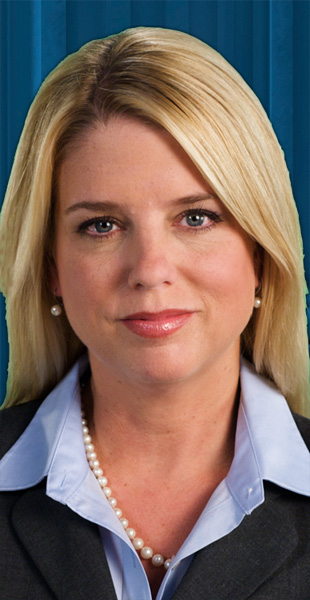Scott Signs Bill To Thwart Human Trafficking
June 18, 2014
Gov. Rick Scott signed a pair of bills Tuesday as the state continues efforts to curb human trafficking.
The new laws (HB 989 and HB 7141) include numerous changes, such as increasing criminal penalties when children are victims of trafficking, requiring specially trained child-protective investigators and case managers and creating a new felony offense when victims are permanently branded. Lawmakers also set aside at least $3 million to help address the issue.
 Attorney General Pam Bondi, who acknowledged the trafficking issue has been an “obsession” of hers for several years, said the most important aspects involve safe houses for victims and the funding to help provide care.
Attorney General Pam Bondi, who acknowledged the trafficking issue has been an “obsession” of hers for several years, said the most important aspects involve safe houses for victims and the funding to help provide care.
“Four years ago, people didn’t want to believe that this was really happening. When we would talk of human trafficking, people thought it only happened on TV or in the movies,” Bondi said. “It’s so horrific no one wants to believe it’s real.”
The state has been ranked third nationally in the number of calls received by the National Human Trafficking Resources Center’s hotline.
In March, Bondi traveled to Mexico City with four of her counterparts for meetings about crimes that have cross-border impacts, including human trafficking, drug trafficking, firearms trafficking, financial crimes and cyber crimes.
“This is alive and thriving in our state, in our country, and in other countries,” said Bondi who added she hopes the state funding will increase.
The House and Senate approved both laws without opposition. Scott said the bills represent “progress, but more needs to be done.”
Deborah Polston, a state advocate for human trafficking victims, called the laws “aggressive” and said they will allow Florida to better care for trafficking victims who have been held captive for labor or the sex industry.
One of the bills (HB 989) increases felony penalties for people who live off the proceeds of others through prostitution or when crimes involve the trafficking of children.
The measure also removes a statute of limitations for human trafficking violations, prohibits minors from working in adult theaters and requires adult theaters to verify the ages of all employees. The law also will create a new third-degree felony for those who permanently brand trafficking victims.
The bill becomes law Oct. 1.
The other bill (HB 7141), which becomes effective July 1, directs the Department of Children and Families to inspect and certify the “safe houses,” where victims can find shelter and services, and to establish services in parts of the state where none exist.
The law would also direct DCF to adopt screening and assessment tools to identify sexually exploited children and would allow such children to be placed in safe houses if the assessment determines that is the most appropriate setting and a place is available.
The law is intended to build on the Florida Safe Harbor Act of 2012, which first created the safe houses and amended state law to classify forced prostitution as child abuse, rather as than a criminal act by the child.
by Jim Turner, The News Service of Florida
Comments
3 Responses to “Scott Signs Bill To Thwart Human Trafficking”



REGARDING:
” when we have an over abundant of laws now that are not being enforced all the while having a resident in the WH that ignores laws on the books for hundreds of years,”
State laws are not enforced by the federal government.
Therefore, the actions or inactions of the White House have nothing to do with the matter at hand.
If you think pimps, madams and other slave dealers should be allowed to continue, just say so.
Otherwise, this seems like a good idea.
David for better people
I fail to see the need to spend all the time and money wasted to create, debate, pass and sign these into law when we have an over abundant of laws now that are not being enforced all the while having a resident in the WH that ignores laws on the books for hundreds of years, and even the ones he himself signed into law. Just don’t make sense. Show me one law a criminal abides by.
Heinous crimes require Heinous punishment.
Justice should not be administered by the weak stomached and faint of heart.